
DESCRIPTION
[Show/Hide]
Myers-Briggs Type Indicator – MBTI
The most well-known and globally used character assessment questionnaire, based on the Myers-Briggs Indicator (MBTI), reworked and customized by The Spiritual Seek staff. This version is the world’s fastest and shortest, In fact it only counts 4 questions and has an execution time under 3 minutes. The results are fairly accurate. In case you are not satisfied with the final profile, we suggest that you restart the test by clicking on the appropriate link and use the function called “Ask me a different question“, so that you can answer new questions and further refine the computation of your result.
4 Pairs of Personality Traits
The acronyms identifying the various character profiles are composed of 4 pairs of elements combined:
1. Introversion-Extraversion (I-E)
2. Sensing-Intuition (S-N)
3. Thinking-Feeling (T-F)
4. Judging-Perceiving (J-P)
An example: INFJ – The Advocate
(Introversion-Intuition-Feeling-Judging)
16 Potential Personality Combinations
There are 16 possible combinations, and each profile has distinctive character traits, strengths and weaknesses. This type of personality assessment test is widely used in Anglo-Saxon societies, with particular regard toward the evaluation of professional aptitude, i.e., in personnel selection and in choosing the most suitable job for each individual.
INTROVERSION vs. EXTRAVERSION
1. Do you like being around people and socializing?
A. Not at all, I feel discomfort
B. Very much, it makes me feel alive
INTROVERSION vs. EXTRAVERSION
1.1 Do you think you have many real friends, say at least 8-10?
A. Yes, at the very least
B. I don’t have any friends
INTROVERSION vs. EXTRAVERSION
1.2 Being the center of attention makes you feel generally:
A. Uncomfortable
B. At ease
INTROVERSION vs. EXTRAVERSION
1.3 Do you ever feel the need to have moments of solitude?
A. Never or almost never
B. Quite often
SENSING vs. INTUITION
2. When a decision has to be made, what approach do you prefer?
A. I mostly follow my gut and sixth sense
B. I gather information and analyze the situation
SENSING vs. INTUITION
2.1 How do you approach an unknown phenomenon?
A. I mainly focus on the feelings it arouses in me
B. I try to rationally understand what it is about
SENSING vs. INTUITION
2.2 Do you find interesting theoretical discussions, such as the explanation of a natural phenomenon?
A. No, not at all
B. Yes, enough or a lot
SENSING vs. INTUITION
2.3 Are you curious about the functioning of objects?
A. No, as long as they work
B. Yes, I like to understand how they work
SENSING vs. INTUITION
2.4 Regarding Philosophy, choose the statement you most agree with:
A. It is generally boring and not useful
B. It can bring interesting food for thought
THINKING vs. FEELING
3. Someone falsely accuses you of telling a lie, what is your first reaction?
A. I get angry and raise my voice
B. I explain my point of view lucidly
THINKING vs. FEELING
3.1 How important are emotions in your life?
A. They are fundamental: I live by emotions
B. Not much: I try to be rational
THINKING vs. FEELING
3.2 Do you ever act impulsively and hastily?
A. Yes, quite frequently
B. Never or almost never
THINKING vs. FEELING
3.3 Do you easily get emotional when watching a movie or reading a book?
A. Yes, I empathize a lot
B. Never or almost never
JUDGING vs. PERCEIVING
4. Are you a person who changes opinions easily?
A. No, I never change my opinion
B. Yes, I often revise my opinions
JUDGING vs. PERCEIVING
4.1 Do you use to plan your life in the medium to long term, such as for the next 5-10 years?
A. No, I prefer to live day by day
B. Yes, I am a far-sighted and organized person
JUDGING vs. PERCEIVING
4.2 Do you ever question your ideas or beliefs?
A. No, I am confident in my ideas
B. Yes, it can happen
JUDGING vs. PERCEIVING
4.3 Does the thought of changing your habits upset you?
A. No, not really
B. Yes, I love my habits
JUDGING vs. PERCEIVING
4. Are you a person who changes opinions easily?
A. No, I never change my opinion
B. Yes, I often revise my opinions
JUDGING vs. PERCEIVING
4.1 Do you use to plan your life in the medium to long term, such as for the next 5-10 years?
A. No, I prefer to live day by day
B. Yes, I am a far-sighted and organized person
JUDGING vs. PERCEIVING
4.2 Do you ever question your ideas or beliefs?
A. No, I am confident in my ideas
B. Yes, it can happen
JUDGING vs. PERCEIVING
4.3 Does the thought of changing your habits upset you?
A. No, not really
B. Yes, I love my habits
THINKING vs. FEELING
3. Someone falsely accuses you of telling a lie, what is your first reaction?
A. I get angry and raise my voice
B. I explain my point of view lucidly
THINKING vs. FEELING
3.1 How important are emotions in your life?
A. They are fundamental: I live by emotions
B. Not much: I try to be rational
THINKING vs. FEELING
3.2 Do you ever act impulsively and hastily?
A. Yes, quite frequently
B. Never or almost never
THINKING vs. FEELING
3.3 Do you easily get emotional when watching a movie or reading a book?
A. Yes, I empathize a lot
B. Never or almost never
JUDGING vs. PERCEIVING
4. Are you a person who changes opinions easily?
A. No, I never change my opinion
B. Yes, I often revise my opinions
JUDGING vs. PERCEIVING
4.1 Do you use to plan your life in the medium to long term, such as for the next 5-10 years?
A. No, I prefer to live day by day
B. Yes, I am a far-sighted and organized person
JUDGING vs. PERCEIVING
4.2 Do you ever question your ideas or beliefs?
A. No, I am confident in my ideas
B. Yes, it can happen
JUDGING vs. PERCEIVING
4.3 Does the thought of changing your habits upset you?
A. No, not really
B. Yes, I love my habits
JUDGING vs. PERCEIVING
4. Are you a person who changes opinions easily?
A. No, I never change my opinion
B. Yes, I often revise my opinions
JUDGING vs. PERCEIVING
4.1 Do you use to plan your life in the medium to long term, such as for the next 5-10 years?
A. No, I prefer to live day by day
B. Yes, I am a far-sighted and organized person
JUDGING vs. PERCEIVING
4.2 Do you ever question your ideas or beliefs?
A. No, I am confident in my ideas
B. Yes, it can happen
JUDGING vs. PERCEIVING
4.3 Does the thought of changing your habits upset you?
A. No, not really
B. Yes, I love my habits
SENSING vs. INTUITION
2. When a decision has to be made, what approach do you prefer?
A. I mostly follow my gut and sixth sense
B. I gather information and analyze the situation
SENSING vs. INTUITION
2.1 How do you approach an unknown phenomenon?
A. I mainly focus on the feelings it arouses in me
B. I try to rationally understand what it is about
SENSING vs. INTUITION
2.2 Do you find interesting theoretical discussions, such as the explanation of a natural phenomenon?
A. No, not at all
B. Yes, enough or a lot
SENSING vs. INTUITION
2.3 Are you curious about the functioning of objects?
A. No, as long as they work
B. Yes, I like to understand how they work
SENSING vs. INTUITION
2.4 Regarding Philosophy, choose the statement you most agree with:
A. It is generally boring and not useful
B. It can bring interesting food for thought
THINKING vs. FEELING
3. Someone falsely accuses you of telling a lie, what is your first reaction?
A. I get angry and raise my voice
B. I explain my point of view lucidly
THINKING vs. FEELING
3.1 How important are emotions in your life?
A. They are fundamental: I live by emotions
B. Not much: I try to be rational
THINKING vs. FEELING
3.2 Do you ever act impulsively and hastily?
A. Yes, quite frequently
B. Never or almost never
THINKING vs. FEELING
3.3 Do you easily get emotional when watching a movie or reading a book?
A. Yes, I empathize a lot
B. Never or almost never
JUDGING vs. PERCEIVING
4. Are you a person who changes opinions easily?
A. No, I never change my opinion
B. Yes, I often revise my opinions
JUDGING vs. PERCEIVING
4.1 Do you use to plan your life in the medium to long term, such as for the next 5-10 years?
A. No, I prefer to live day by day
B. Yes, I am a far-sighted and organized person
JUDGING vs. PERCEIVING
4.2 Do you ever question your ideas or beliefs?
A. No, I am confident in my ideas
B. Yes, it can happen
JUDGING vs. PERCEIVING
4.3 Does the thought of changing your habits upset you?
A. No, not really
B. Yes, I love my habits
JUDGING vs. PERCEIVING
4. Are you a person who changes opinions easily?
A. No, I never change my opinion
B. Yes, I often revise my opinions
JUDGING vs. PERCEIVING
4.1 Do you use to plan your life in the medium to long term, such as for the next 5-10 years?
A. No, I prefer to live day by day
B. Yes, I am a far-sighted and organized person
JUDGING vs. PERCEIVING
4.2 Do you ever question your ideas or beliefs?
A. No, I am confident in my ideas
B. Yes, it can happen
JUDGING vs. PERCEIVING
4.3 Does the thought of changing your habits upset you?
A. No, not really
B. Yes, I love my habits
THINKING vs. FEELING
3. Someone falsely accuses you of telling a lie, what is your first reaction?
A. I get angry and raise my voice
B. I explain my point of view lucidly
THINKING vs. FEELING
3.1 How important are emotions in your life?
A. They are fundamental: I live by emotions
B. Not much: I try to be rational
THINKING vs. FEELING
3.2 Do you ever act impulsively and hastily?
A. Yes, quite frequently
B. Never or almost never
THINKING vs. FEELING
3.3 Do you easily get emotional when watching a movie or reading a book?
A. Yes, I empathize a lot
B. Never or almost never
JUDGING vs. PERCEIVING
4. Are you a person who changes opinions easily?
A. No, I never change my opinion
B. Yes, I often revise my opinions
JUDGING vs. PERCEIVING
4.1 Do you use to plan your life in the medium to long term, such as for the next 5-10 years?
A. No, I prefer to live day by day
B. Yes, I am a far-sighted and organized person
JUDGING vs. PERCEIVING
4.2 Do you ever question your ideas or beliefs?
A. No, I am confident in my ideas
B. Yes, it can happen
JUDGING vs. PERCEIVING
4.3 Does the thought of changing your habits upset you?
A. No, not really
B. Yes, I love my habits
JUDGING vs. PERCEIVING
4. Are you a person who changes opinions easily?
A. No, I never change my opinion
B. Yes, I often revise my opinions
JUDGING vs. PERCEIVING
4.1 Do you use to plan your life in the medium to long term, such as for the next 5-10 years?
A. No, I prefer to live day by day
B. Yes, I am a far-sighted and organized person
JUDGING vs. PERCEIVING
4.2 Do you ever question your ideas or beliefs?
A. No, I am confident in my ideas
B. Yes, it can happen
JUDGING vs. PERCEIVING
4.3 Does the thought of changing your habits upset you?
A. No, not really
B. Yes, I love my habits
Your MBTI Profile:
ISTJ – Logistician
Introverted-Sensitive-Thinking-Judging
ISTJs are practical, fact-oriented individuals who value tradition, stability, and order. They are known for their reliability, attention to detail, and strong sense of duty. ISTJs excel at analyzing information, making logical decisions, and following through on tasks. They prefer to work independently, focusing on concrete facts and proven methods. ISTJs are often described as reserved, serious, and dependable. They value efficiency, organization, and a systematic approach to problem-solving. ISTJs are loyal, hardworking, and committed to their responsibilities, whether at work, home, or in their communities.
Strong points: Honesty, candor, willpower, calmness, practicality, versatility
Weak points: Stubbornness, lack of sensitivity, excessive attachment to rules, hypercriticism toward self and others.
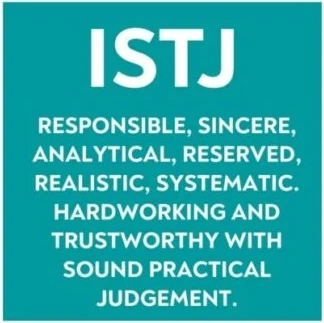
<< RESTART THE TEST – TOP OF PAGE
Your MBTI Profile:
ISFJ – Defender
Introverted-Sensitive-Feeling-Judging
ISFJs are warm, caring, and detail-oriented individuals who prioritize the needs of others. They are known for their loyalty, reliability, and commitment to their duties. ISFJs excel at providing support, understanding, and practical assistance to those around them. They prefer to work behind the scenes, focusing on the needs of individuals and maintaining a harmonious environment. ISFJs are often described as quiet, reserved, and considerate. They value tradition, stability, and a sense of belonging. ISFJs are patient, conscientious, and dedicated to fulfilling their responsibilities to the best of their abilities. They find great satisfaction in helping others and contributing to the well-being of their communities.
Strong points: Readiness, reliability, observation skills, enthusiasm, perseverance, practical sense.
Weak points: Excessive humility, taking things too personally, repressing own feelings, making too many commitments, reluctance toward change, excessive selflessness.
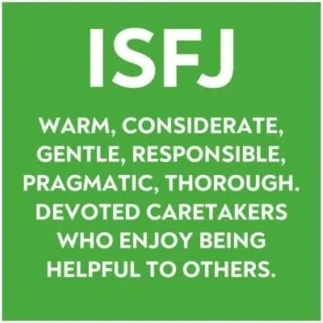
<< RESTART THE TEST – TOP OF PAGE
Your MBTI Profile:
INFJ – Advocate
Introverted-Intuitive-Feeling-Judging
INFJs are idealistic, compassionate, and insightful individuals who strive to make a positive impact on the world. They are known for their creativity, intuition, and deep understanding of others. INFJs excel at seeing the big picture, identifying patterns, and finding innovative solutions to complex problems. They prefer to work in quiet, reflective environments, focusing on their inner world of ideas and values. INFJs are often described as private, principled, and deeply caring. They value authenticity, personal growth, and making a difference in the lives of others. INFJs are driven by their strong moral compass and their desire to help humanity. They are skilled at understanding and empathizing with others, and they often serve as mentors, counselors, or advocates for those in need.
Strong points: Creativity, discernment, consistency, ethics, passion, selflessness.
Weak points: Excessive sensitivity, reluctance toward openness, perfectionism, lack of attention toward everyday life, susceptibility to burnout.
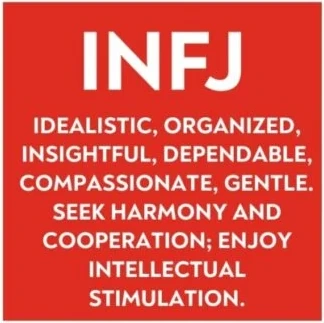
<< RESTART THE TEST – TOP OF PAGE
Your MBTI Profile:
INTJ – Architect
Introverted-Intuitive-Thinking-Judging
INTJs are independent, analytical, and strategic individuals who excel at long-term planning and problem-solving. They are known for their creativity, innovation, and ability to see the big picture. INTJs excel at identifying patterns, synthesizing information, and developing comprehensive solutions. They prefer to work in quiet, focused environments, relying on their own judgment and expertise. INTJs are often described as reserved, confident, and intellectually curious. They value knowledge, competence, and efficiency. INTJs are driven by their desire to understand the world around them and to create lasting change. They are skilled at anticipating future trends, identifying potential obstacles, and developing contingency plans. INTJs are often drawn to fields that allow them to apply their analytical and strategic thinking, such as science, technology, research, or leadership roles.
Strong points: Rationality, education, independence, determination, curiosity, originality.
Weak points: Arrogance, contempt for feelings, hypercriticism, aggressiveness, poor social skills.
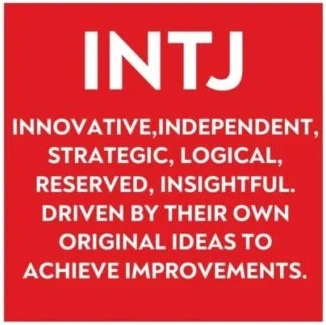
<< RESTART THE TEST – TOP OF PAGE
Your MBTI Profile:
ISTP – Virtuoso
Introverted-Sensitive-Thinking-Perceptive
ISTPs are adaptable, curious, and action-oriented individuals who thrive on solving practical problems. They are known for their mechanical aptitude, hands-on skills, and ability to think on their feet. ISTPs excel at analyzing situations, identifying potential risks, and finding efficient solutions. They prefer to work in dynamic environments, focusing on immediate tasks and tangible results. ISTPs are often described as reserved, flexible, and pragmatic. They value freedom, independence, and the ability to work at their own pace. ISTPs are driven by their desire to understand how things work and to find practical applications for their knowledge. They are skilled at troubleshooting, repairing, and creating things with their hands. ISTPs often gravitate towards careers that allow them to work with tools, machinery, or technology, such as engineering, mechanics, or law enforcement.
Strong points: Spontaneity, rationality, recognition of own priorities, confidence, ability to unplug.
Weak points: Stubbornness, lack of sensitivity, excessive secrecy, susceptibility to boredom, difficulty in making commitments, risky attitudes.
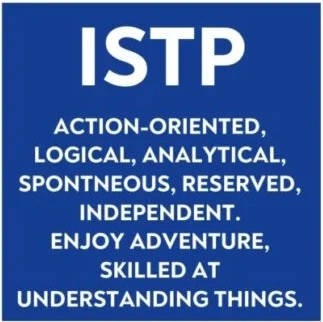
<< RESTART THE TEST – TOP OF PAGE
Your MBTI Profile:
ISFP – Adventurer
Introverted-Sensitive-Feeling-Perceptive
ISFPs are gentle, sensitive, and artistic individuals who value authenticity and personal expression. They are known for their creativity, appreciation for beauty, and ability to live in the moment. ISFPs excel at creating unique and meaningful works of art, whether through painting, music, writing, or other forms of self-expression. They prefer to work in quiet, peaceful environments, focusing on their inner world of emotions and sensations. ISFPs are often described as reserved, flexible, and accepting. They value harmony, personal growth, and the freedom to be true to themselves. ISFPs are driven by their desire to create beauty, express their feelings, and connect with others on a deep level. They are skilled at empathizing with others, appreciating the present moment, and finding joy in simple pleasures. ISFPs often gravitate towards careers that allow them to express their creativity and connect with others, such as art, design, music, or social work.
Strong points: Charm, sensitivity, imagination, enthusiasm, curiosity, artistic aptitude.
Weak points: Excessive sense of independence, unpredictability, susceptibility to stress, excessive competitiveness, unstable self-esteem.
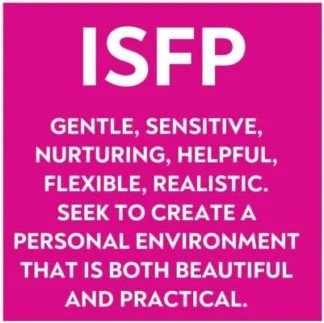
<< RESTART THE TEST – TOP OF PAGE
Your MBTI Profile:
INFP – Mediator
Introverted-Intuitive-Feeling-Perceptive
INFPs are idealistic, compassionate, and introspective individuals who strive to make the world a better place. They are known for their creativity, empathy, and strong moral compass. INFPs excel at understanding others, seeing the potential in people and situations, and finding innovative solutions to complex problems. They prefer to work in quiet, reflective environments, focusing on their inner world of values and emotions. INFPs are often described as reserved, principled, and deeply caring. They value authenticity, personal growth, and making a positive impact on the lives of others. INFPs are driven by their desire to help humanity, to create meaningful connections, and to express their unique perspectives. They are skilled at empathizing with others, seeing multiple perspectives, and finding creative ways to solve problems. INFPs often gravitate towards careers that allow them to help others, express their creativity, and make a positive difference, such as counseling, social work, education, or the arts.
Strong points: Empathy, generosity, open-mindedness, creativity, passion, idealism.
Weak points: Lack of realism, lack of concentration, self-isolation, emotional vulnerability, need for acceptance, excessive self-criticism.
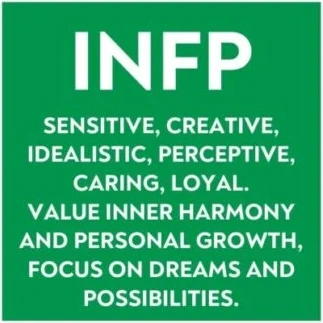
<< RESTART THE TEST – TOP OF PAGE
Your MBTI Profile:
INTP – Logician
Introverted-Intuitive-Thinking-Perceptive
INTPs are analytical, curious, and innovative individuals who excel at solving complex problems. They are known for their logical thinking, intellectual curiosity, and ability to see the world from a unique perspective. INTPs excel at analyzing information, identifying patterns, and developing new theories and ideas. They prefer to work in quiet, focused environments, relying on their own judgment and expertise. INTPs are often described as reserved, independent, and intellectually curious. They value knowledge, competence, and the pursuit of truth. INTPs are driven by their desire to understand the world around them and to find innovative solutions to complex problems. They are skilled at thinking outside the box, questioning assumptions, and finding creative ways to approach challenges. INTPs often gravitate towards careers that allow them to apply their analytical and creative thinking, such as research, science, technology, or academic roles.
Strong points: Analytical skills, originality, open-mindedness, curiosity, objectivity.
Weak points: Disconnection from reality, lack of sensitivity, restlessness, impatience, perfectionism.
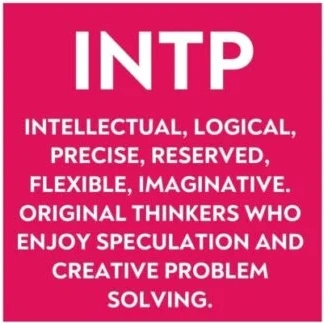
<< RESTART THE TEST – TOP OF PAGE
Your MBTI Profile:
ESTP – Entrepreneur
Extraverted-Sensitive-Thinking-Perceptive
ESTPs are energetic, adaptable, and action-oriented individuals who thrive on excitement and new experiences. They are known for their quick thinking, resourcefulness, and ability to take calculated risks. ESTPs excel at assessing situations, identifying opportunities, and taking immediate action. They prefer to work in dynamic environments, focusing on tangible results and practical solutions. ESTPs are often described as outgoing, flexible, and pragmatic. They value freedom, independence, and the ability to make their own decisions. ESTPs are driven by their desire for excitement, adventure, and the thrill of the moment. They are skilled at thinking on their feet, adapting to changing circumstances, and finding creative ways to overcome obstacles. ESTPs often gravitate towards careers that allow them to work with people, take on challenges, and see immediate results, such as sales, marketing, entrepreneurship, or law enforcement.
Strong points: Boldness, rationality, practical sense, originality, perspicacity, candor, social skills.
Weak points: Lack of sensitivity, impatience, willingness to take risks, lack of planning, lack of foresight, provocative attitude.
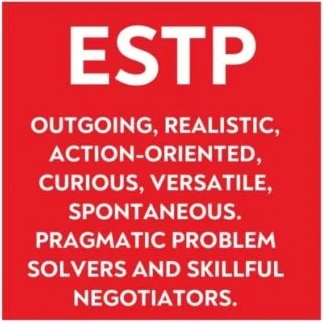
<< RESTART THE TEST – TOP OF PAGE
Your MBTI Profile:
ESFP – Entertainer
Extraverted-Sensitive-Feeling-Perceptive
ESFPs are outgoing, fun-loving, and spontaneous individuals who thrive on social interaction and new experiences. They are known for their warmth, charm, and ability to live in the moment. ESFPs excel at creating a positive atmosphere, connecting with others, and finding joy in simple pleasures. They prefer to work in dynamic environments, focusing on the needs of individuals and the immediate task at hand. ESFPs are often described as friendly, flexible, and enthusiastic. They value harmony, authenticity, and the ability to express themselves freely. ESFPs are driven by their desire for excitement, connection, and the appreciation of beauty and sensory experiences. They are skilled at empathizing with others, adapting to changing circumstances, and finding creative ways to entertain and delight. ESFPs often gravitate towards careers that allow them to work with people, express their creativity, and bring joy to others, such as entertainment, hospitality, sales, or social work.
Strong points: Courage, originality, aesthetic taste, practical sense, social skills.
Weak points: Excessive sensitivity, excessive condescension, easy to get bored, inability to plan, lack of concentration.
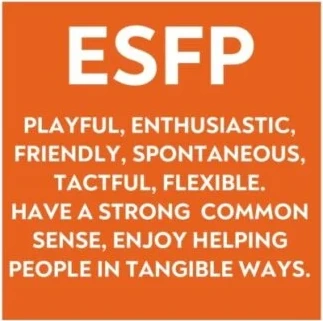
<< RESTART THE TEST – TOP OF PAGE
Your MBTI Profile:
ENFP – Campaigner
Extraverted-Intuitive-Feeling-Perceptive
ENFPs are enthusiastic, imaginative, and idealistic individuals who thrive on personal growth and making a positive impact on the world. They are known for their creativity, adaptability, and ability to see the potential in people and situations. ENFPs excel at brainstorming ideas, connecting with others, and finding innovative solutions to complex problems. They prefer to work in dynamic environments, focusing on their inner world of emotions and possibilities. ENFPs are often described as outgoing, curious, and passionate. They value authenticity, personal growth, and the freedom to explore new ideas and experiences. ENFPs are driven by their desire to help others, to create meaningful connections, and to make a positive difference in the world. They are skilled at empathizing with others, seeing multiple perspectives, and finding creative ways to approach challenges. ENFPs often gravitate towards careers that allow them to express their creativity, connect with others, and make a positive impact, such as education, counseling, social work, or the arts.
Strong points: Curiosity, perceptiveness, verbal ability, enthusiasm, cheerfulness, goodness.
Weak points: Need to please others, lack of concentration, lack of organization, excessive optimism, restlessness.
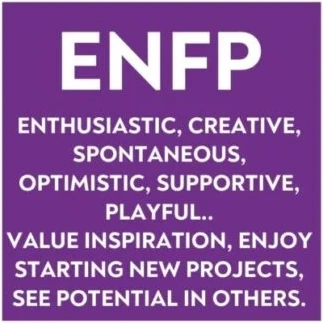
<< RESTART THE TEST – TOP OF PAGE
Your MBTI Profile:
ENTP – Debater
Extraverted-Intuitive-Thinking-Perceptive
ENTPs are innovative, curious, and intellectually stimulating individuals who thrive on challenging ideas and finding creative solutions. They are known for their quick wit, resourcefulness, and ability to see multiple perspectives. ENTPs excel at analyzing information, identifying patterns, and developing new theories and ideas. They prefer to work in dynamic environments, focusing on their inner world of possibilities and the big picture. ENTPs are often described as outgoing, independent, and intellectually curious. They value knowledge, competence, and the pursuit of truth. ENTPs are driven by their desire to understand the world around them, to find innovative solutions to complex problems, and to engage in stimulating intellectual discourse. They are skilled at thinking outside the box, questioning assumptions, and finding creative ways to approach challenges. ENTPs often gravitate towards careers that allow them to apply their analytical and creative thinking, such as entrepreneurship, consulting, research, or academic roles.
Strong points: Versatility, quick thinking, originality, creativity, charisma, enthusiasm.
Weak points: Excessive polemicism, lack of sensitivity, intolerance, difficulty in concentrating, aversion to practical problems.
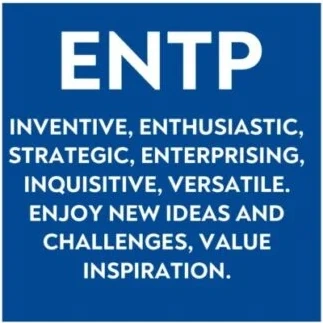
<< RESTART THE TEST – TOP OF PAGE
Your MBTI Profile:
ESTJ – Executive
Extraverted-Sensitive-Thinking-Judging
ESTJs are practical, organized, and decisive individuals who thrive on taking charge and getting things done. They are known for their leadership abilities, strong sense of responsibility, and commitment to tradition and order. ESTJs excel at analyzing information, making logical decisions, and implementing plans efficiently. They prefer to work in structured environments, focusing on tangible results and proven methods. ESTJs are often described as outgoing, assertive, and hardworking. They value efficiency, organization, and a systematic approach to problem-solving. ESTJs are driven by their desire to maintain stability, uphold traditions, and ensure that tasks are completed effectively. They are skilled at delegating responsibilities, setting clear expectations, and holding themselves and others accountable. ESTJs often gravitate towards careers that allow them to take on leadership roles, make decisions, and ensure that systems and processes run smoothly, such as management, law, or government.
Strong points: Dedication, sense of duty, candor, loyalty, patience, organization.
Weak points: Inflexibility and stubbornness, inability to handle extraordinary situations, excessive moralism, over-emphasis on others’ judgment, difficulty in relaxing, difficulty in expressing emotions.
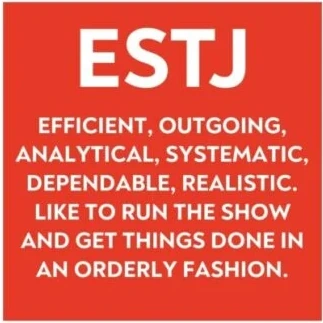
<< RESTART THE TEST – TOP OF PAGE
Your MBTI Profile:
ESFJ – Consul
Extraverted-Sensitive-Feeling-Judging
ESFJs are warm, organized, and people-oriented individuals who thrive on creating harmony and ensuring that everyone’s needs are met. They are known for their loyalty, attention to detail, and commitment to serving others. ESFJs excel at understanding and anticipating the needs of individuals, maintaining a harmonious environment, and ensuring that tasks are completed efficiently. They prefer to work in structured environments, focusing on the needs of others and upholding traditions and social norms. ESFJs are often described as outgoing, conscientious, and considerate. They value harmony, tradition, and the ability to make a positive impact on the lives of others. ESFJs are driven by their desire to help others, to maintain a sense of order and stability, and to ensure that everyone feels valued and appreciated. They are skilled at empathizing with others, providing emotional support, and ensuring that tasks are completed to a high standard. ESFJs often gravitate towards careers that allow them to work with people, provide support and service, and ensure that systems and processes run smoothly, such as teaching, nursing, social work, or human resources.
Strong points: Practical sense, sense of duty, loyalty, sensitivity.
Weak points: Excessive anxiety about social status, inflexibility, reluctance to change, touchiness, excessive attention-seeking, excessive altruism.
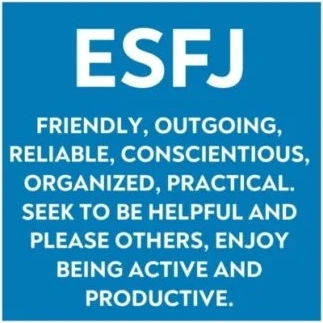
<< RESTART THE TEST – TOP OF PAGE
Your MBTI Profile:
ENFJ – Protagonist
Extraverted-Intuitive-Feeling-Judging
ENFJs are charismatic, idealistic, and people-oriented individuals who thrive on helping others and making a positive impact on the world. They are known for their warmth, empathy, and ability to inspire and motivate others. ENFJs excel at understanding and anticipating the needs of individuals, creating a harmonious environment, and ensuring that tasks are completed efficiently. They prefer to work in structured environments, focusing on the needs of others and upholding their values and principles. ENFJs are often described as outgoing, principled, and deeply caring. They value authenticity, personal growth, and the ability to make a positive difference in the lives of others. ENFJs are driven by their desire to help others, to create meaningful connections, and to make the world a better place. They are skilled at empathizing with others, providing emotional support, and inspiring others to reach their full potential. ENFJs often gravitate towards careers that allow them to work with people, provide leadership and guidance, and make a positive impact on the world, such as teaching, counseling, social work, or politics.
Strong points: Receptivity, reliability, conviction, selflessness, charism.
Weak points: Lack of realism, excessive idealism, over-accommodating, frenzy, excessive empathy.
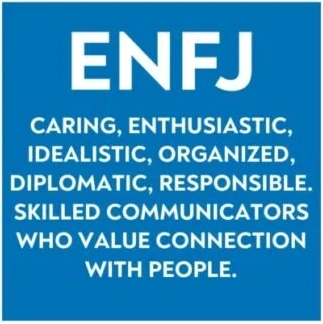
<< RESTART THE TEST – TOP OF PAGE
Your MBTI Profile:
ENTJ – Commander
Extraverted-Intuitive-Thinking-Judging
ENTJs are confident, assertive, and strategic individuals who thrive on taking charge and making things happen. They are known for their leadership abilities, analytical thinking, and ability to see the big picture. ENTJs excel at analyzing information, making logical decisions, and implementing plans efficiently. They prefer to work in structured environments, focusing on tangible results and proven methods. ENTJs are often described as outgoing, assertive, and intellectually curious. They value competence, efficiency, and the ability to make a positive impact on the world. ENTJs are driven by their desire to lead, to make a difference, and to ensure that tasks are completed effectively. They are skilled at delegating responsibilities, setting clear expectations, and holding themselves and others accountable. ENTJs often gravitate towards careers that allow them to take on leadership roles, make decisions, and ensure that systems and processes run smoothly, such as management, entrepreneurship, politics, or the military.
Strong points: Efficiency, energy, self-esteem, willpower, strategic thinking, charisma and inspiration.
Weak points: Stubbornness, intolerance, low emotional intelligence, frenzy, arrogance, coldness.
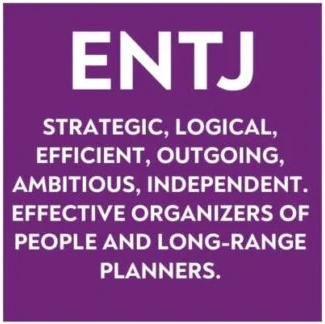
<< RESTART THE TEST – TOP OF PAGE
